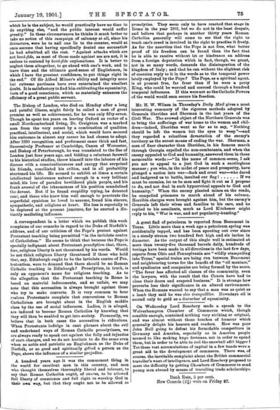A correspondent in a letter which we publish this week
complains of our remarks in regard to the Duke of Norfolk's address, and of our criticism of the Pope's protest against Protestant teaching being permitted "in the inviolate centre of Catholicism." He seems to think that because the Pope is specially indignant about Protestant proselytism that, there. fore, religious liberty is not threatened by his words. Would be not think religious liberty threatened if those who bold that, say, Edinburgh ought to be the inviolate centre of Pro_ testantism, were to demand that there should be no Roman Catholic teaching in Edinburgh ? Proselytism, in truth, is only an opponent's name for religions teaching. As to the allegation that the Protestant teaching in Rome is based on material inducements, and so unfair, we may note that this accusation is always brought against those who try to make converts. It is very common to hear zealous Protestants complain that conversions to Roman Catholicism are brought about in the English middle class by the use of social influences. Ladies, it is alleged, are induced to become Roman Catholics by knowing that they will then be enabled to get into society. Personally, we believe that in both cases the accusation is ridiculous. When Protestants indulge in cant phrases about the evil and underhand ways of Roman Catholic proselytisers, we are always ready to speak out against the folly and injustice of such charges, and we do not hesitate to do the same even when so noble and patriotic an Englishman as the Duke of Norfolk, or so good and spiritually gifted a person as the Pope, shows the influence of a similar prejudice.






































 Previous page
Previous page